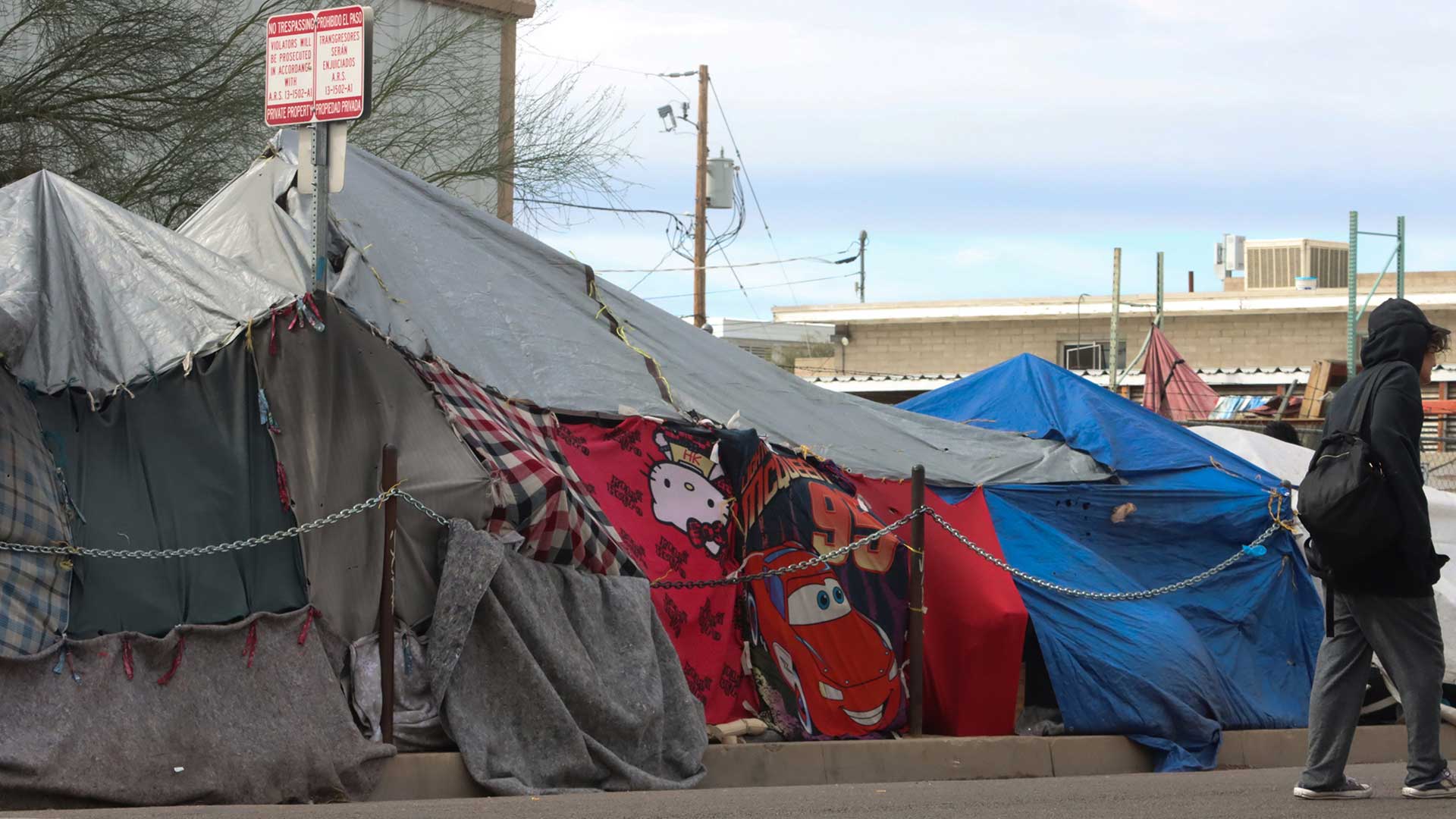 A person walks past tarps, cloths, and tents set up as temporary living spaces on West Madison Street in “The Zone,” the area surrounding the Human Services Campus in Phoenix on March 1, 2023.
A person walks past tarps, cloths, and tents set up as temporary living spaces on West Madison Street in “The Zone,” the area surrounding the Human Services Campus in Phoenix on March 1, 2023.
One of the propositions on this November’s ballot would give property owners a way to recoup some of the costs of cleaning up nuisances if their local government doesn’t. Proposition 312 is a direct response to an infamous homeless camp in Phoenix.
It was called The Zone, and it stretched for blocks, with up to a thousand unhoused people living in tents and sleeping bags, a short walk from the state capitol. 12 News Phoenix reported on the hazards it posed.
“Makeshift fires are a common sight in the zone ...I'm one of my bones they hurt really bad... but if they get out of control...(fire call)”:13
Jenna Bentley, Director of Government Affairs with the libertarian-leaning Goldwater Institute, says The Zone came into being because city officials told police not to enforce anti-camping laws.
“When the city stopped enforcing, told Phoenix PD to kind of leave that area alone, kind of made it off limits, we saw it get out of hand very quickly. I mean it became very violent. there was a lot of crime going on there," Bentley said in an interview.
Phoenix eventually cleaned out the Zone under a court order, but smaller camps like it exist throughout the state. Last year the Republican-dominated legislature passed a bill that would force cities to clean up the camps and even arrest some of those living in them. Democratic Governor Katie Hobbs vetoed it.
So this year, the Goldwater Institute and conservative lawmakers like Senator Jake Hoffman decided to bypass the Governor and take the issue directly to voters.
“Government has a lot of tools to go after citizens who don't follow the law but when our government doesn't follow the law or doesn't enforce the law, our citizens are limited on what they can do and so this is an enforcement mechanism that was brought to me,” Sen. Hoffman (R-Queen Creek) told the Senate Finance Committee at a hearing in January.
If voters pass Proposition 312, here’s how it would work. Say someone creates a nuisance on your property because local government refuses to enforce laws against illegal camping, loitering, panhandling, public urination or defecation, or public alcohol or drug use.
If you pay to have your property cleaned up, you can force your city or county government to reimburse you for the cost, up to 100 percent of your property tax bill. If the nuisance continues in future years, you can keep getting reimbursed for your cleanup costs.
The legislature voted along party lines to refer the question to the voters. No Democrats supported it.
Opponents say the state legislature shouldn’t be telling local officials what crimes are more important than others.
“Police officers responding to nuisance calls for public urination or public intoxication take resources away from real victims of violence, and many communities calls regarding domestic violence make up the largest category of calls a police department receives, and these types of calls should be prioritized,” Natalia Brown, an advocate for victims of domestic violence, told the committee.
Goldewater’s Jenna Bentley says no one is trying to criminalize homelessness or take resources away from other causes, like domestic abuse. They’re just trying to get local government to focus on public safety
“We pay taxes and the base function of government is to provide public health, safety services, and if they're going to be derelict in providing those services we want to give the property owners some sort of relief. So the goal here is to just have the cities do their jobs,” Bentley said.
Senate Minority Leader Mitzi Epstein (D-Tempe) says city governments, not the state, should decide what matters most to them.
“We do not want to incentivize cities to prioritize something like public urination, which is a nuisance, which apparently is what this is part of, and not take care of domestic violence calls. So let's make sure that we allow our cities to prioritize what they should prioritize,” Epstein said in explaining her no vote in the Senate Committee.
Proposition 312 was put on the ballot in part because cities have been reluctant to forcibly clean up homeless camps when shelters are full, under a 2018 federal court ruling that essentially said homelessness is not a crime. But after the proposition was put on the ballot, the US Supreme Court overturned that ruling, giving cities wider latitude to remove encampments.
Nevertheless, backers of 312 say it’s still needed.

By submitting your comments, you hereby give AZPM the right to post your comments and potentially use them in any other form of media operated by this institution.